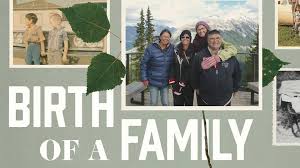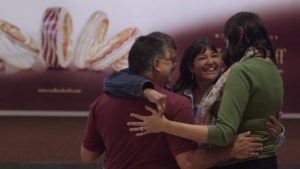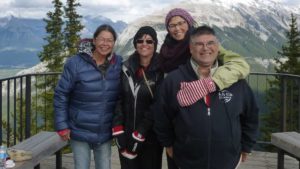“Birth of a family” documentary reflections (60s scoop)

“We’re travelling, we’re a family!” Ben exclaims as MJ Adam’s now-adult children roll out of the YYC airport on their way to Banff. “We’re travelling, we’re a family!” as excitement. “We’re travelling, we’re a family!” as hopefulness, and as comfort in knowing both destination and companions that will be there at the other end of their route. The consent and security in choosing one’s movements and with whom they move. Something absolutely not afforded to all four of these folks when as children they were taken from their mother Mary Jane during the height of the 60s scoop.
The documentary “Birth of a Family” caught me by surprise. It was sad and engrossing, absolutely, and it was also quite tender and sweet in many ways as we watch these siblings open up to each other after so many decades of separation. It was an excellent way to contextualize HOW RECENT the scoop was, and the ongoing, present-day legacy it has left on both the children themselves and the communities from which they were taken. Truthfully, I knew shamefully little about the scoop and its widespread impact prior to this documentary and the more investigative elements of this course. The fact that at least 20 000 documented children were removed is a truly staggering number and it has helped me deeply question the uncompromising support I had felt for social workers in the past. The sympathy-baiting used when folks (myself included) focused only on the difficulty of their jobs acted as an intentional distraction for the complicity of social workers and the welfare system in attempted cultural genocide of Indigenous people throughout canada. It shows not-so-shocking inertia in seeking to investigate the comprehensive histories of the places in which I and other settlers live, most often without consent.

It was touching to see how despite a lifetime of family taken from the Adam kids, they all managed to melt into the roles of siblings. I could so easily picture them growing up together and the laughter and the fights and the family quirks they could have had. Betty Ann as the put together, organized, slightly frazzled and extremely caring older sis. Rose as rebellious and cheeky and stylish to boot. Ben so gentle and observant and perhaps a lil dorky in such a charming way. Esther, quiet and reserved and reflective, exuding unmatchable power. How fitting that she looked most like MJ of all the children. Their conversations sharing the pain they felt in loving their adopted families but knowing always how deeply incomplete their upbringing and hearts were due to being isolated from their indigenous identity. Their disconnection from traditionalist Indigenous practices. Their disconnection from each other. From their mom and the Dene community that MJ couldn’t even return to after the trauma of residential school.
Many more reflections to come in the reflections next week, and for now I will let these ramblings rest.
Some notes from viewing:
- “If I met my real family, I’d get something that I’d never had” Betty Anne
- Assumption of failure being a single mother, unable to care
- Raised very differently from blood family, carry differing values
- Grappling with the love for adopted parents vs. need for blood connection (Esther)
- “We’re travelling, we’re a family”
- “Best way to learn is hands on”
- People talking to Betty Ann needing her to agree that she is better off without being raised by her mom- not lucky, but ripped off
- Overwhelmed by all the new experiences she hasn’t been taught that should have been when she was kindergarten age
- “You have to relive all them hurts” Ben

Leave a Reply